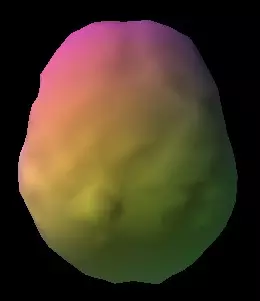
Aaron Hernandez was supposed to be the epitome of the American Dream—overcoming childhood setbacks to earn a spot in the NFL on the New England Patriots. Millions of kids across America wish they could be so lucky. But the 2020 documentary on Netflix, “Killer Inside: The Mind of Aaron Hernandez,” takes a deep dive into his life to investigate how his dream unraveled into a nightmare. Convicted of murdering his friend Odin Lloyd and accused of killing two other men (but found not guilty), Hernandez took his own life in a prison suicide in 2017. He was only 27.
The compelling docuseries explores many of the factors that could have contributed to the tragic end of such a promising life—childhood abuse, unstable parenting, hidden bisexuality. And then there was his brain. The docuseries delivers a fascinating look at his troubled brain, but it misses one key factor that may have contributed to Hernandez’ brain dysfunction.
The Brain of Aaron Hernandez
After Hernandez’s death, his brain was delivered to Boston University, where researchers made razor-thin slices for examination. Their findings? His brain was “riddled” with Stage 3 chronic traumatic encephalopathy (CTE). This neurodegenerative disease, which has 4 stages, has been found in athletes like football players, boxers, and soccer players who endure repeated concussions and other blows to the head. It has been associated with memory loss, cognitive dysfunction, and suicidal thoughts and behavior.
A Boston University publication reported that Ann McKee, director of BU’s Chronic Traumatic Encephalopathy Center, said that his brain was the worst case of CTE ever seen in someone so young. “Especially in the frontal lobes, which are very important for decision-making, judgment, and cognition, we could see damage to the inner chambers of the brain,” she said. The frontal lobes are also involved in impulse control, empathy, and learning from past experiences.
The documentary focuses heavily on CTE and the significant role it likely played in Hernandez’ downfall, and for good reason. The filmmakers also hone in on another aspect of his life that may have contributed to his troubles—cannabis use. It is reported that the football player began smoking marijuana regularly in high school and continued to smoke throughout his pro career. The docuseries calls him a “chainsmoker” with a serious habit, but it neglects to connect the dots between marijuana use and brain dysfunction.
Marijuana and the Brain
A growing body of evidence shows that marijuana use impairs brain activity. In the largest known brain imaging study, which appeared in the Journal of Alzheimer’s Disease, scientists from Amen Clinics, Google, Johns Hopkins University, UCLA, and the UC San Francisco evaluated 62,454 brain SPECT scans of more than 30,000 individuals (ages 9 months to 105 years) to investigate factors that accelerate brain aging. SPECT (single-photon emission computed tomography) is a brain imaging technology that measures brain activity and blood flow. The study found that a number of brain disorders and behaviors predicted accelerated aging. Of all the disorders and behaviors analyzed, cannabis abuse ranked as the second-highest brain ager, topped only by schizophrenia.
The study, which included brain scans from 1,000 cannabis users, 25,168 non-cannabis users, and 100 healthy controls, showed reduced cerebral blood flow among the cannabis users compared to non-users and healthy controls. A significant decrease in blood flow was noted specifically in the right hippocampus, an area of the brain that helps with memory formation. This part of the brain is severely affected in those that suffer from Alzheimer’s disease.

Healthy SPECT Scan

Other research has concluded that marijuana harms the teenage brain in numerous ways. For example, a 2019 review found that it increases the risk of depression and suicidal thoughts and behaviors. And marijuana use at a young age has also been associated with increased impulsivity.
Although pot promoters would argue that most people who smoke marijuana don’t become murderers and don’t die by suicide, it’s important to understand that in vulnerable people it may have negative impacts on brain function that contribute to unhealthy behaviors. Sadly, considering that Hernandez’s brain was so damaged by CTE, marijuana use was likely only making bad brain function worse.
You Can Change Your Brain
Unfortunately, this information is too late to help Hernandez, but it isn’t too late for other football players who have endured years of helmet-to-helmet tackles. A study at Amen Clinics on 30 retired professional football players who had suffered head trauma showed that after following a brain healthy program for 6 months, 80% showed significant improvement in blood flow to the frontal lobes, as well as improvements in overall cognitive functioning, processing speed, attention, reasoning, and memory. Hall of Fame quarterback Terry Bradshaw spoke openly about his own brain rehabilitation after suffering multiple concussions.
Likewise, it isn’t too late for people who grew up in traumatic households. See how a man named Kevin overcame his traumatic upbringing to enhance his brain health using a variety of innovative therapies. And it isn’t too late for people who have been bad to their brain with drug use. Find out how Arnie broke free from the chains of addiction. It’s never too late to start enhancing brain function.
The world’s largest database of brain scans related to behavior—over 160,000 and growing—shows that when you adopt a brain health program, you can change your brain and change your life for the better.
At Amen Clinics, we take a unique brain-body approach that gets to the root cause of your symptoms. Our comprehensive evaluations include brain SPECT imaging, as well as laboratory testing and assessing other important factors that could be contributing to symptoms. By getting to the root cause of your symptoms, we can create a more effective, personalized treatment plan for you.
If you want to join the tens of thousands of people who have already enhanced their brain health, overcome their symptoms, and improved their quality of life at Amen Clinics, speak to a specialist today at 888-288-9834. If all our specialists are busy helping others, you can also schedule a time to talk.





This article speaks to Marijuana aging the brain. Has there been any studies on CBD aging the brain or what effects it may have on the brain.
I would be interested in any studies in this area.
Gina Repko
Comment by Gina Repko — February 19, 2020 @ 6:53 AM
Makes a person wonder of the quality of the cannabis….whether it had pesticides/herbicides,etc..I do believe that cannabis indica oil with the THC….and that has ALL of the plants components is the true healer.
Comment by John Szewczyk — February 21, 2020 @ 5:11 AM
My 16 year old son has been prescribed CBD oil, I’m concerned about even the less than 1% THC being a long term problem with his brain development. Are there any studies or brain scans related to CBD oil and the teen brain?
Comment by KE — February 21, 2020 @ 5:21 AM
Can second-hand marijuana smoke affect a non-smoker’s brain? I ask because my next door neighbor smokes this stuff and it comes through the vents in my unit and then I am forced to inhale it.
Comment by Margaret — February 21, 2020 @ 8:51 AM
There are alot of confounding factors involved here. No mention is made about terpenes and the entourage effects that help to modulate in the endocannibinoid system. Also, the young man may have had longterm undiagnosed mental llness. Indeed much research needs to be done regarding cannabis, I might add, as being the correct term rather than the pregorative marijuana. There are many phytochemicals in cannabis that are barely identified yet even isolated and individually researched! Most importantly part of the propaganda that existed in the past against cannabis must start to be elimanated by use of the correct nonmenclature term of cannibis. All said it is tragic of all the premature deaths involved here and perhaps there are even undiscovered parst of the brain that are involved in CTE There could be a phantom system involved like the dorsolateral prefrontal cortex, a part of the brain that helps to control implusivity be is really a nonentity it is a physical anatomical part. It is through anomalies and difference that w elearn more baout the brain and it is premature to assume that cannabis played much role here in and of itself. Many cultivars of cannabis vary widely in terpene and thc content and htis difference can be hugh in the behavioral pharmacology of the substance in question, cannabis!
Comment by mike — February 21, 2020 @ 10:17 AM
Thank you for your informed comment. I am an 81 year old Canadian woman and I use medically prescribed cannabis oil. CBD with very little THC 1 – 5%. Use it for pain and sleep. It works for me and I am grateful for it.
Comment by Iona McMillan — February 21, 2020 @ 4:32 PM
If big. oversized people keep running into each other constantly…what should one expect…Sports, all sports, especially contact sports like crawling into a confined cage and pummeling someone else until he is unconscious…is stupid…Of course, our society promotes stupidity to entertain the masses. It sells and it’s profitable…Of course, after the combatants awake and feel some pain…there are opioids, illegal drugs, alcohol…even CBD to rub away the pain…
Excellent and beneficial to study the brain but until we understand human behaviour we will continue to produce stupid people…
Comment by Dr. Henry Sinopoli — February 22, 2020 @ 8:04 AM
You give us the diagnosis but
no protocol on how or wat to do besides going to the clinic which costs thousands of dollars.
Comment by Ceidre Hayward — February 22, 2020 @ 1:04 PM
Well said , you must be in the medical field.
Comment by DAVORAH miller — February 23, 2020 @ 5:17 AM
Exactly!!! Many of your methods and approaches sound of interest but not everyone can afford your fees. If one was truly passionate and sincere in wanting to help people you would think it wouldn’t come at such a high cost!!!There are families and desperate mothers looking for alternatives to problematic medication….
Comment by Jennifer — February 24, 2020 @ 10:38 AM
I also am interested in learning about the brain health program. Both my children have had sports related concussions. However, getting them to a clinic would not be doable or financially possible. I would pay something but I can not afford hundreds of dollars. I think I heard you mention a new book that speaks of the protocols. That would be perfect and affordable for so many families.
Comment by Cherry Chism — April 6, 2020 @ 10:09 AM
Hello Cherry, thank you for reaching out. Yes, one of our doctors has published a new book that would be an excellent new resource for you to start with: https://www.amazon.com/Concussion-Rescue-Comprehensive-Program-Traumatic/dp/0806540230/
Comment by Amen Clinics — April 8, 2020 @ 10:26 AM